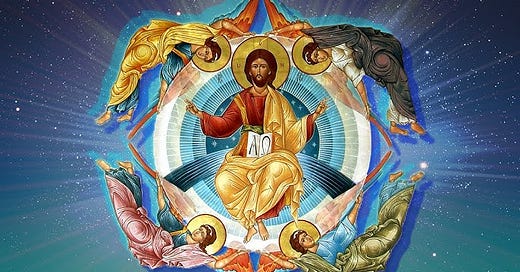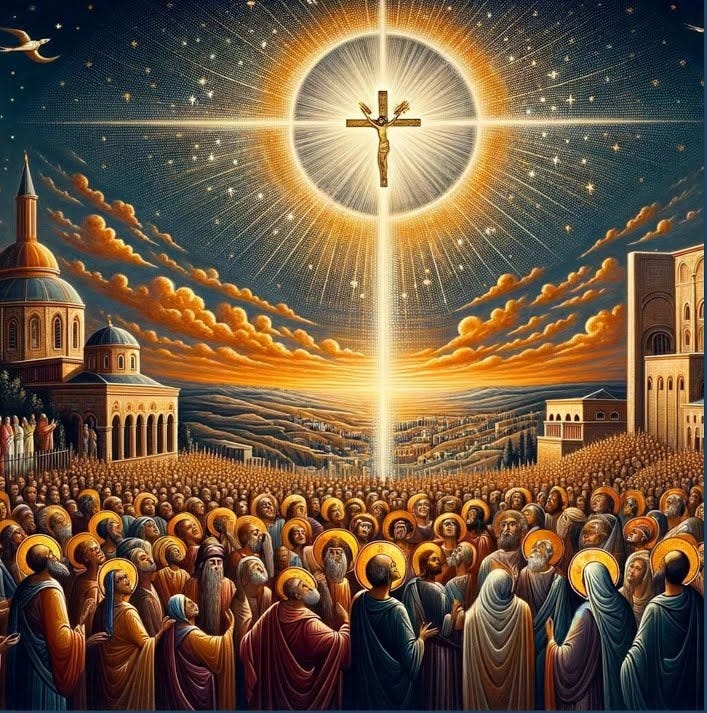“For when one considers the universe, can anyone be so simple-minded as not to believe that the Divine is present in everything, pervading, embracing and penetrating it?”
St. Gregory of Nyssa
Acts 8:18-25
In those days, when Simon saw that the Spirit was given through the laying on of the apostles’ hands, he offered them money, saying, “Give me also this power, that any one on whom I lay my hands may receive the Holy Spirit.” But Peter said to him, “Your silver perish with you, because you thought you could obtain the gift of God with money! You have neither part nor lot in this matter, for your heart is not right before God. Repent therefore of this wickedness of yours, and pray to the Lord that, if possible, the intent of your heart may be forgiven you. For I see that you are in the gall of bitterness and in the bond of iniquity.” And Simon answered, “Pray for me to the Lord, that nothing of what you have said may come upon me.”
Now when they had testified and spoken the word of the Lord, they returned to Jerusalem, preaching the gospel to many villages of the Samaritans.
John 6:35-39
The Lord said to the Jews who believed in him: “I am the bread of life; he who comes to me shall not hunger, and he who believes in me shall never thirst. But I said to you that you have seen me and yet do not believe. All that the Father gives me will come to me; and him who comes to me I will not cast out. For I have come down from heaven, not to do my own will, but the will of him who sent me; and this is the will of him who sent me, that I should lose nothing of all that he has given me, but raise it up at the last day.”
Commemoration of the Apparition of the Sign of the Precious Cross Over Jerusalem, in 351 AD
The Precious Cross appeared in the sky over Jerusalem on the morning of May 7, 351 during the reign of the emperor Constantius, the son of Saint Constantine (May 21).
At that time the heresy of Arianism, which taught that Christ was merely a creature and not God, was causing great turmoil and division throughout the Empire. Even after the First Ecumenical Council at Nicea in 325, many people were drawn to this false teaching, and the Orthodox found themselves in the minority in many places.
Constantius, the ruler of the eastern part of the Empire, was a fervent supporter of Arianism. His brothers Constantine II and Constans, who were pious Orthodox Christians, ruled in the west. They were both killed in separate battles around 350, leaving Constantius as sole ruler. Also in 350, Saint Cyril (March 18) became Patriarch of Jerusalem and began his zealous struggle against Arianism.
In May of 351 a luminous Cross appeared over Jerusalem, stretching from Golgotha to the Mount of Olives, a distance of about five and a half miles. The Cross was wide as it was long, and shone more brightly than the sun. Many people left their homes and workplaces to gather in the church and glorify Christ. The historian Sozomen says that this wondrous sign led to the conversion of multitudes of pagans and Jews to Christianity.
A letter from Saint Cyril to the emperor describing this phenomenon, and admonishing him to become Orthodox, has been preserved. The apparition of the Cross remained over the city for a whole week.
The vision of the Cross over Jerusalem strengthened the Orthodox faithful and contributed to the return of many Arians to the Church. It is also a reminder of the awesome Second Coming of Christ, when “the sign of the Son of man shall appear in heaven” (Matthew 24:30).
Freedom as a dread gift from God
Fr. Andreas Agathokleous
We’ve learned about a God who determines people’s fate, who decides what will happen to us without consulting us first, who’s revealed as the ruler over the whole world. In the face of such a God, who can doubt or deny Him without fear of the consequences? A God like that you either accept and submit to or reject. This is the God of all religions.
But Orthodox teaching and tradition tells us about a Triune God and therefore love. Real love is inseparable from freedom. Since our love is usually confined to compassion or excessive interest in the person we love, it’s difficult for us to equate freedom with love, which is why we interfere in the way of life of others, ‘out of love, for their own good’. Either that or we equate freedom with indifference.
God, Who is love (I Jn. 4, 8), fully respects our freedom, even if this is expressed negatively with regard to our very existence. Had He intervened to prevent the first-created from breaking the commandment, they would no longer have enjoyed the gift of ‘His image’, so some other, irrational being would have been created, but certainly not a human person. The same is true of us, in that we’re human persons, not animals. His intervention in each of our decisions should be activated by us insofar as we want it, not as He wants it- though, because He’s love it would be for our benefit- otherwise this would negate our independence, which is the great and really dread gift with which He has endowed us. As Saint Sophrony in Essex said, even though we’re God’s creation, “He doesn’t impose anything on us by force, not even love for Him as our Father. He’s revealed to us ‘as He is’ and allows us to react freely” [We shall see Him as He is, Essex 1988]. The final decision to live eternally with Him in love or not is ours, since God loves us all and therefore wants all of us to be saved. In any case, enforced habitation and experience of paradise- which is a communion of love in freedom- would actually be hell.
If God can do anything except force us to love Him, it’s obvious how much weight our freedom carries, since it determines our manner of existence in eternity. Of course, the freedom which is accommodated within each of us isn’t to be equated with indifference and the denial of responsibilities, with whatever way we see fit to behave. God’s love is always being extended to each of us, in a manner we understand, sending us messages, not commands. In this way we can see the various events that befall us as being fortuitous, and His interest as not being oppressive. This is why He usually declines to work miracles, since this would force us to believe in Him.
“All our experiences are lived empirically and so is our freedom, in its essential dimension. Because, however much we’ve accepted this gift, we still need to practice the understanding and cultivation of it if we’re to move on from instability to the perfect stability that will be apparent in eternity as the final gift of God the Savior” [Saint Sophrony We shall see Him as He is, Essex 1988].
We are most fortunate that, by God’s grace, we have recently seen a number of saints and theologians who have brought to life the ancient message of Orthodox teaching for people in modern society. One such theologian was Fr. Alexander Schmemann, who has this to say on the same subject:
‘Those who oppose religion always claim that people invented God in response to fear, and that all religion is nothing but the fruit of this coercion… But never once did Christ compel anyone to follow him; never once did he force anyone to believe him through coercion…Yes, God reveals Himself to people… But He reveals Himself in such a way that each person is free to accept this revelation, to experience it as his own salvation… but he is just as free not to see, not to discern, God’s revelation, to reject it… Christianity affirms the person’s freedom, or more accurately, the person as a free being’ (The Celebration of Faith, Saint Vladimir’s Seminary Press, 1991).
This week’s calendar reminders:
Monday 5/5: Matins 8:30 a.m.
Tuesday 5/6: no services or events
Wednesday 5/7: no services or events
Thursday 5/8: Matins 8:30 a.m.
Friday 5/9: Matins 8:30 a.m.
Saturday 5/10: Catechumen Class 4:30 p.m.; Great Vespers 6 p.m.
Sunday 5/11: Divine Liturgy 9:15 a.m.
CLICK BELOW to donate online:
Christ the Savior Orthodox Church is located in Southbury, Connecticut, and is part of the New England Diocese of the Orthodox Church of America.
Mailing address: Christ the Savior Church, 1070 Roxbury Road, Southbury, CT 06488
PLEASE DONATE to help our parish do the work of the Lord, thrive and grow, and extend the Kingdom of God. May the Lord bless your generosity!
Fr. Moses Locke can be reached at frmoseslocke@gmail.com











